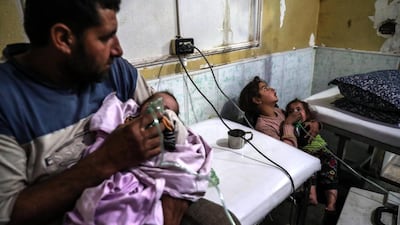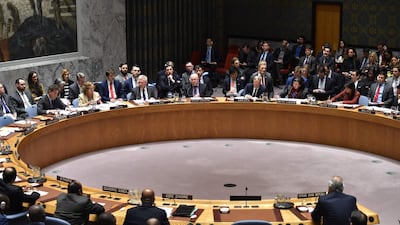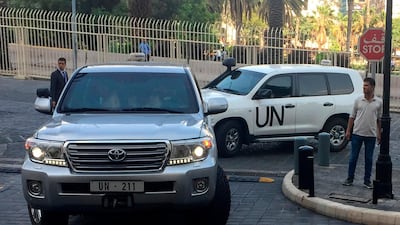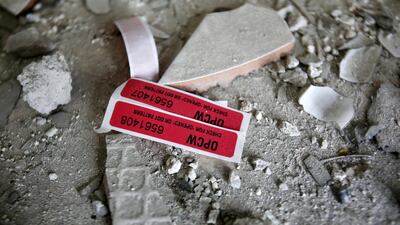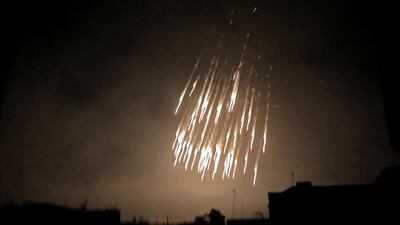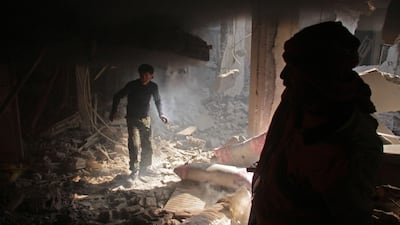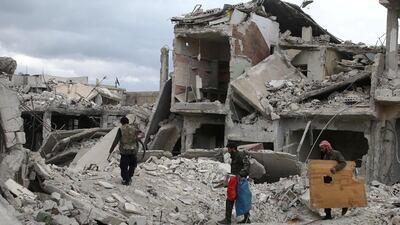The regime of Syrian President Bashar Al Assad has been actively rebuilding its chemical weapons stockpile since at least 2018, Britain's ambassador to the UN told the Security Council said on Tuesday.
Barbara Woodward's assessment follows last week's release of a report from Organisation for the Prohibition of Chemical Weapons, in The Hague, which confirmed that the Syrian regime was responsible for the 2018 chemical weapons attack on the city of Douma.
“It’s of grave concern," Ms Woodward said of the new stockpiles.
“Yet again, we are faced with undeniable evidence that the Syrian state has used chemical weapons to murder its own citizens"
She urged the Syrian regime to destroy all stockpiles, adding: “We owe it to those who have suffered such attacks to hold Syria to account.”

When asked about Ms Woodward's assertion that his country is building its chemical weapons stockpile, Syria's ambassador to the UN, Bassam Sabbagh, said it was part of Britain's “hostile propaganda”.
The UN High Representative for Disarmament Affairs, Izumi Nakamitsu, repeated the need to identify and hold accountable any entity that would “dare” to use chemical weapons.
“The absence of accountability for that use is a threat to international peace and security and a danger to us all,” Ms Nakamitsu said.
She said the OPCW was preparing a new round of investigations and Syria continued to hinder them.
The OPCW investigation into the April 2018 Douma attack was conducted between January 2021 and December 2022.
The report stated that during the major military offensive aimed at removing rebels from the outskirts of Damascus and regaining control of Douma, “at least one Mi-8/17 helicopter” of the Syrian “Tiger Forces” unit “dropped two yellow cylinders” containing toxic chlorine gas, which hit “two residential buildings in a central area” of Douma.
The first cylinder “ruptured, and rapidly released toxic gas, chlorine, in very high concentrations, which rapidly dispersed within the building”, killing 43 people, the OPCW report said.
The second cylinder smashed into an apartment and slowly released some chlorine, “mildly affecting those who first arrived at the scene”.
Douma was the final target of the Syrian regime campaign to reclaim control of the Eastern Ghouta suburbs of Damascus from opposition forces.
The report said the Investigation and Identification Team received “credible information, corroborated through multiple sources” that Russian forces were co-located at Dumayr airbase alongside the Tiger Forces.
Bonnie Jenkins, US undersecretary for arms control, pointed out the “extremely troubling role of the Russian forces” after the attack.
“When Syrian and Russian military police denied and delayed OPCW's inspectors access to the site in an effort to set up their own state investigations, they also attempted to sanitise the site and remove incriminating evidence of chemical weapon use,” Ms Jenkins said.
Russia's ambassador to the UN, Vasily Nebenzia, said Moscow rejected “in advance" any IIT findings.
"Its destructive and politicised activity has nothing to do with the principles of impartiality and objectivity," Mr Nebenzia said.
About the time of the attack, Syria's ally Moscow claimed that the UK was responsible for staging “the fake chemical weapons attack” in Douma, as a pretext for launching a wider military assault on the Syrian regime.
Fernando Arias, director general of the OPCW, said “the work of the IIT proves that the attack could not be staged".
The UN watchdog called on Damascus to co-operate with the international community and hand over military personnel who were behind the attack.
